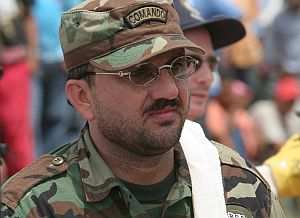 Colombian Paramilitary Leader
Colombian Paramilitary Leader
Born February 26, 1966, Jiménez Naranjo a.k.a. Macaco (Macaco) was the leader of the Bloque Central Bolívar (BCB), a paramilitary group within the umbrella Autodefensas Unidas de Colombia (AUC) [United Self-Defense Forces of Colombia]. Commanding an estimated 7,000 armed combatants, Macaco united various distinct paramilitary forces—including the Bloque Cacieuq Pipintá, Bloque Sur de Putumayo, Bloque Libertadores del Sur, Bloque Mártires de Guatita, Bloque Vencedores de Arauca, and Bloque Sur de los Andaquíes—under the umbrella of the Bloque Central Bolívar.
Narco-Trafficker and Human Rights Abuser
Leading this group of united paramilitary forces gave Macaco a considerable degree of territorial control and influence, especially over large cocaine-producing regions. According to U.S. federal indictments, Macaco’s organization is “responsible for exporting thousands of kilograms of cocaine from Colombia to Central America, Mexico and the United States.” [1]
Macaco’s criminal conspiracy operated from around December 1997 through at least September 2007. His illegal financial network involved numerous known criminals and operated via several businesses that served as front organizations for money laundering and drug trafficking. [2]
In 2001, the U.S. Department of the Treasury’s Office of Foreign Assets Control recognized Macaco as “among the most dangerous Colombian narcotics traffickers today.” [3] As a further step to dismantle his organization, a joint investigation of the Colombian National Police and the U.S. Drug Enforcement Agency seized $75 million worth of illegally obtained property belonging to Macaco. [4]
recognized Macaco as “among the most dangerous Colombian narcotics traffickers today.” [3] As a further step to dismantle his organization, a joint investigation of the Colombian National Police and the U.S. Drug Enforcement Agency seized $75 million worth of illegally obtained property belonging to Macaco. [4]
At the same time, Macaco’s organization is known to have been involved in mass human rights violations, including the perpetration of war crimes and crimes against humanity. As commander of the Bloque Central Bolívar (BCB), Macaco led his forces on multiple violent campaigns that resulted in the perpetration of massacres, forced disappearances, torture, sexual abuse, murders, lethal threats, and mass forced displacement of urban neighborhoods. [5]
Macaco’s Free Confession: Over 400 Violent Crimes
In 2003, Macaco demobilized along with other members of the AUC high command and their fighters. He joined the Colombian Justice and Peace process in 2005. During his free confession before a Justice and Peace tribunal—called a versión libre— Macaco admitted responsibility for participating in more than 400 violent crimes. [6]
Among these, several conspicuous incidents stand out: Between September and October 2001—under Macaco’s direct command—the BCB murdered 21 residents of the departments of Risaralda and Caldas. In 2003—on his orders—the Bloque Sur de Andaquíes kidnapped and killed three members of a family in Caquetá, Huila. [7] Between 2003 and 2005, he also ordered the murders of some 49 individuals, including Luis Carlos Olarte, ex-councilmember of Segovia, Sucre; Fernando García Vargas, sub-commander of the army; and a football referee in La Cruzada, Antioquia. In 2002, Macaco personally murdered a sergeant and two soldiers belonging to the Guala del Ejército, on the road to Florencia, Bolívar, and assassinated an official of the Colombian Office of the Attorney General, also in Florencia, in 2003. On May 10, 2001, his forces murdered Eduardo Teherán for refusing to join the BCB. [8]
Extradition to the United States
In May 2008, Macaco was the first of fourteen demobilized paramilitary combatants—including the high-ranking leaders of the AUC—to be extradited to the United States to stand trial in the U.S. District Courts for the District of Columbia, the Southern and Middle Districts of Florida, the Southern District of New York, and the Southern District of Texas on charges of narco-trafficking, money laundering, and provision of material support to a terrorist organization. [9]
Macaco faces charges of conspiracy to manufacture and distribute five kilograms or more of cocaine, with intent to import cocaine into the United States; and of engaging in drug trafficking with the intent to provide something of pecuniary value to a terrorist organization. [10]